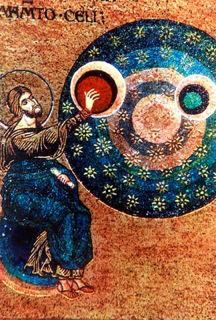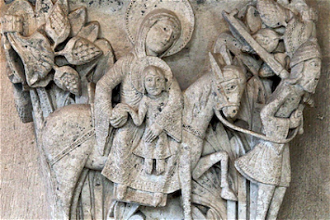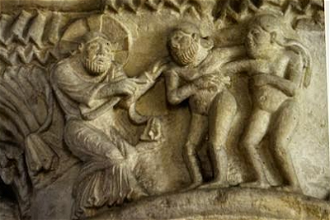The Great 'O' Antiphons - 17 December - O Sapientia

Short History
One of the great treasures of the Roman Catholic Liturgy of the Hours are the 'O' antiphons that accompany the Gospel Canticle of the Magnificat, sung at Evening Prayer from the 17th to the 23rd of December. They are wonderful poetic and scriptural images of Christ, taken from the prophecies of Isaiah. There are seven of them, and each one unfolds in a sequence starting with Christ the Word and Wisdom of God at creation, the 'logos' of John's Gospel, and ending with the nativity, Emmanuel, 'God-is-with-us'.
The are assumed to be very ancient texts, possibly dating from the 6th century. We know that in the early Middle Ages the Benedictine Monks of Fleury intoned the antiphons in order of community precedence beginning with the Abbot, and after Vespers each member of the community was given a gift! This then became quite a widely followed tradition elsewhere!
The texts set to haunting plainchant added to the intensity of the Advent season and wove together both the anticipation of the Christmas feasts and the desire for Christ's coming in glory. Later on it became the custom to ring the great bells of the church as a joyful accompaniment to the singing of the antiphons and Magnificat.
They are a wonderful example of our ancient tradition of consecrating the hours of the day by prayer together, particularly by celebrating Evening Prayer in this last week of Advent. As a preparation for the feasts of the Nativity we can use them at home, perhaps as a grace before the main meal each day or as part of our domestic prayer life. To help us, a short reflection on each one will be given each day.
December 17th - O Sapientia
O wisdom, coming forth from the mouth of the Most High, reaching from one end to the other, mightily and sweetly ordering all things: Come and teach us the way of prudence. ( trans Common Worship)
The history of the early Church, is full of arguments about the nature and person of Jesus Christ. That was inevitable, for his resurrection transformed the disciples experience of him in purely human terms and opened for them and all who follow them the way to find Christ in the many aspects of his presence amongst us until he comes in glory at the end of time!
To experience him in faith is one thing, but belief has also to be articulated and understood, so the great doctrine of Jesus Christ as truly God and truly human can be part of teaching and catechesis.
The antiphon O Sapientia, O Wisdom takes us to the vision of Isaiah who prophecies the coming Messiah as the very 'Wisdom' of God, the one to whom the Spirit of the Lord is given, the Spit of wisdom and understanding ( Is 11.2) and the one who is also 'the Lord Almighty, whose plan is wonderful, whose wisdom is magnificent.'(Is 28.29)
We need to remind ourselves, especially in these times of great concern for our environment and all creation, that we also believe Christ is the eternal Word, the one who speaks the words of naming life at the very dawn of creation itself. This is the cosmic Christ who was, is, and will be for ever. He is the Word who became flesh for us all, in Jesus of Nazareth. We can never separate him from the Trinity, for with the Creator and Holy Spirit he sustains and upholds our life always.
We pray that Christ the wisdom of God will help us be more attuned to the presence of God in all living things, more aware of our task as the stewards of God, to uphold and care for creation on this small planet of ours and to be more prudent and wise, in our dealings with others!
Fr Robin Gibbons is an Eastern Rite Catholic Chaplain for the Melkites in the UK. He is also an Ecumenical Canon of Christ Church Oxford


















